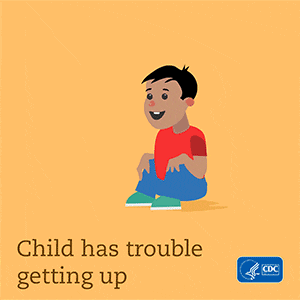Duchenne Muscular Dystrophy Care Considerations
Duchenne muscular dystrophy (DMD) is a rare genetic (inherited) disease defined by muscle weakness that gets worse over time and ultimately affects the heart and lungs. People born with DMD will see many healthcare providers throughout their lives.
As science and medicine are advancing, people with DMD are living longer; therefore, their care throughout life is evolving as well. These care considerations, funded by the Centers for Disease Control and Prevention (CDC), are intended to raise the standards of care, help clinicians provide the best possible care to people with DMD, and give families and caregivers the necessary information to manage their care.
The updated care considerations for DMD are contained in a set of three articles published in Lancet Neurology. They offer the latest clinical considerations to improve care and quality of life for people living with DMD. Clinicians who specialize in treating people with DMD developed these care considerations based on current evidence for optimal care reported in the literature and their own clinical experiences.
The following medical specialties are included in the updated care considerations for DMD:
- Endocrinology (hormones and their function)
- Bone health
- Primary care
- Emergency care
- Transition from adolescence to adulthood
- Diagnosis
- Neurology (the brain and nerves)
- Rehabilitation
- Gastrointestinal (the digestive tract) care and nutritional management
- Pulmonary (the lungs and breathing)
- Cardiology (the heart and it’s function)
- Orthopedic (bone and joint) care and surgical management
- Psychosocial (mental health) care
Read the articles here:
- Diagnosis and management of Duchenne muscular dystrophy, part 1: Diagnosis, neuromuscular, rehabilitation, endocrine, and gastrointestinal and nutritional management
- Diagnosis and management of Duchenne muscular dystrophy, part 2: Respiratory, cardiac, bone health, and orthopaedic management
- Diagnosis and management of Duchenne muscular dystrophy, part 3: Primary care, emergency management, psychosocial care, and transitions of care across the lifespan
Care Considerations Pediatrics Supplement
The Pediatrics supplement, also funded by the CDC, is a set of 13 articles that expands on the clinical care for each subspecialty outlined in the Lancet Neurology articles. The supplement provides new resources, including a toolkit to help individuals with DMD transition into adult medical care. These articles and resources can help families and providers manage DMD care. Also included is an article on evaluation of the care considerations, with key elements of care that clinics can measure.
Read the supplement articles here »
Resources Available to People with DMD and Their Families
Parent Project Muscular Dystrophy has a series of care checklists to help families track each stage of Duchenne.
The DMD Family Guide [PDF – 6.66 MB], created by a group of non-profit organizations that work to improve the lives of people with DMD and their families, summarizes the content of the care considerations articles in a printable-booklet format. This guide is designed to give families detailed information on the medical care that individuals with DMD need at each stage of their lives.
What You Can Do
If you’re concerned about the physical development of your child or a child you know, use the free online tool, Physical Developmental Delays: What to look forExternal, to help determine if you should consult with your child’s doctor.
Child Muscle WeaknessExternal is a free online tool designed to help clinicians, therapists, and other specialists diagnose muscle weakness in children as early as possible. Early diagnosis could lead to more personalized care for each person living with muscular dystrophy and may give each of them a better chance to reach his or her full potential.
- Read about the MD CARE ActExternal, which authorizes the CDC to work on muscular dystrophy activities
- Parent Project Muscular Dystrophy (PPMD)ExternalA national non-profit organization focusing on Duchenne muscular dystrophy. PPMD funds research, raises awareness, promotes advocacy, makes connections within the DMD community, and broadens treatment options.
- Muscular Dystrophy Association (MDA)ExternalA national non-profit agency that works to cure muscular dystrophy through research. MDA provides health care, support services, advocacy, and education.

